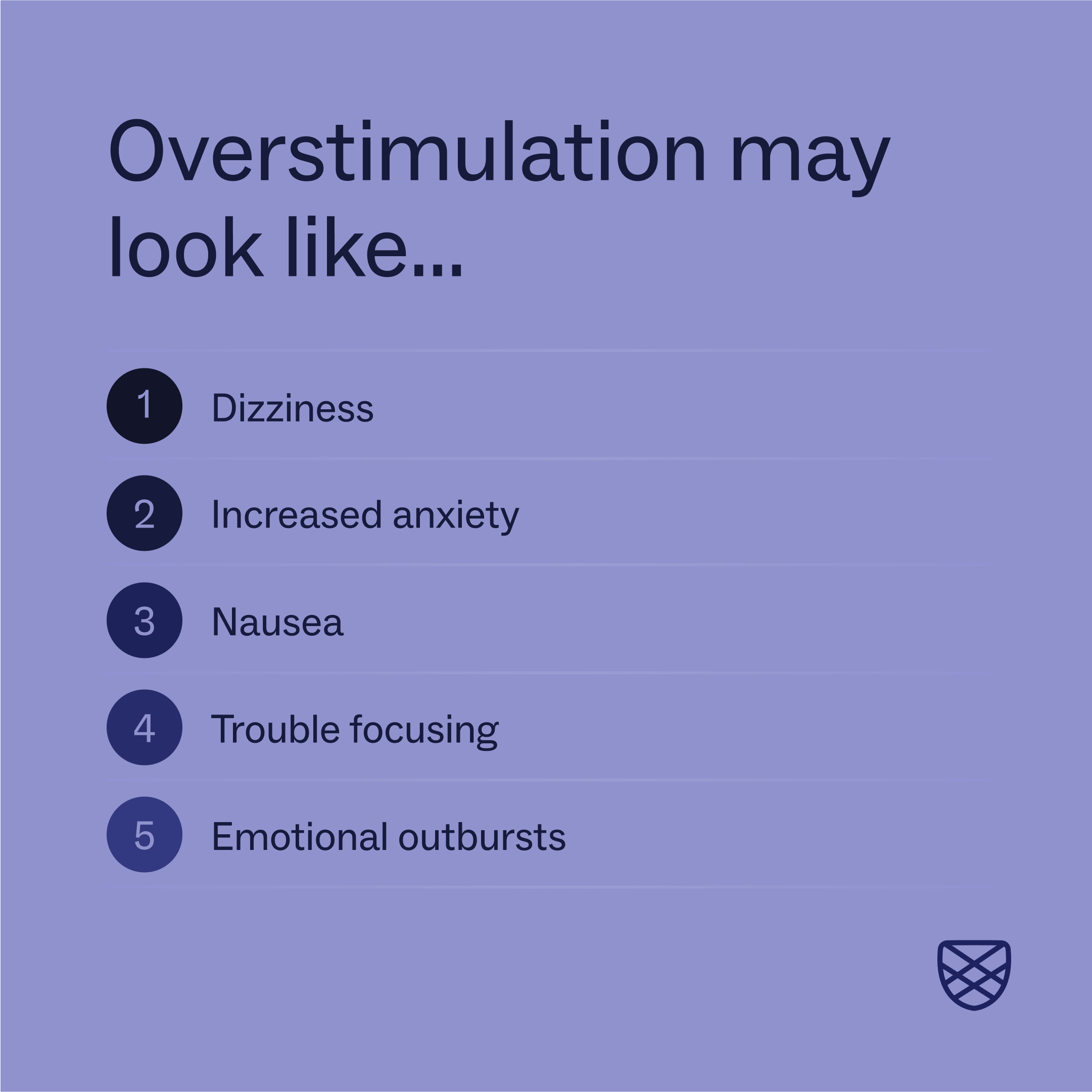
Table of Contents
Here’s Why You’re Feeling Overstimulated — And What to Do About It

Written By: Ethan Cohen BSN, RN

Clinically Reviewed By: Dr. Don Gasparini
Updated: September 22, 2025
7 min.
Feeling overstimulated can be a sign of an underlying mental health condition, but healing is possible.
Learn more about our Clinical Review Process
Table of Contents
Do you ever feel overwhelmed by what is happening around you? Maybe you feel uneasy because of bright lights in a room, the sound of multiple people talking, or music coming from an overhead speaker— and the only way to feel relief is to remove yourself from the situation. If this experience sounds familiar to you, you may be experiencing sensory overload, also known as overstimulation. This feeling of being overwhelmed can sometimes be a sign of being in survival mode.For certain people, overstimulation can interfere with their ability to function on a daily basis. In fact, several mental health conditions can affect how a person receives and processes sensory information, leading to an increase in the frequency and severity of symptoms related to sensory overload. Learn more about the relationship between mental health and overstimulation and how to address the challenges that come with overstimulation here.

We can help you feel less overwhelmed
Intensive mental health support with other people who get it.
What is overstimulation?
Overstimulation describes when a person is feeling overwhelmed by sensory input around them. Any combination of sound, touch, taste, sight, smell, and loud noises can cause this reaction.
Specifically, prolonged exposure to bright lights, certain sounds, strong smells, particular tactile stimulation such as certain textures and materials, and crowded spaces are common triggers for sensory overload.
During episodes of overstimulation, people experience the sensations around them to a greater extent than they usually would, leading to physical symptoms that can be disruptive, including:
- Headaches, dizziness, light-headedness, or sensory fatigue.
- Feeling ill, faint, or nauseous due to strong smells, flashing lights, or crowded movement
- Increased anxiety and stress, which, if chronic and severe, can sometimes be related to toxic stress or lead to panic attacks
- Irritability and agitation
- Issues with sleeping or restlessness
- Difficulty regulating emotions leading to emotional outbursts
- Difficulty focusing: Competing sensory signals scatter attention, making it hard to concentrate or complete tasks.

Overstimulation and the brain
Overstimulation happens, in large part, because of the brain. One of the brain’s primary functions is to collect and process sensory information, but when there’s too much sensory input, it can make the brain think there’s danger, sending off signals to the body to escape. This triggers the body’s fight-flight-freeze response, and feelings of anxiety, fear, and discomfort take over.
Some research shows that people with certain sensory processing issues (including overstimulation) have quantifiable differences in their brain structure, which may contribute to their difficulties. For instance, early childhood trauma has been linked to structural brain changes that lead to processing issues, including sensory overload.
Similarly, overstimulation is a common occurrence for individuals with disorders related to trauma, such as post-traumatic stress disorder and acute stress disorder. Understanding reactions around a trauma anniversary can be particularly relevant for those with PTSD. Not every person who experiences overstimulation has structural changes to their brain, but it is important to keep these structural changes in mind when thinking about mental health and well-being.

Overstimulation and co-occurring mental health conditions
Feeling overwhelmed can happen to anyone, but overstimulation is more common in people with certain co-occurring developmental and mental health conditions. Here are several conditions commonly associated with sensory overload:
1. Autism spectrum disorder
Autism spectrum disorder (ASD) is a developmental disorder marked by challenges in social interaction, communication, and repetitive behaviors. People with ASD perceive sensory information differently from others, and for this reason, sensory overload is a common experience.
For people with ASD, their atypical sensory processing can lead to various behavioral, emotional, and physical responses that can significantly impact their lives.
2. Attention-deficit/hyperactivity disorder (ADHD)
ADHD is a common disorder that causes hyperactivity, impulsive behavior, and trouble paying attention. People with ADHD have differences in the way they process sensory information, and for this reason, they may be more sensitive or reactive to sensory stimuli in their environment.
Additionally, they may have difficulty filtering out irrelevant sensory information. For this reason, people with ADHD are prone to overstimulation and the frustration, irritability, and anxiety that come with it. For those looking for support, there are tips for young people with ADHD that can help.

3. Post-traumatic stress disorder (PTSD)
PTSD is a mental health condition that can happen in people who’ve experienced or witnessed a traumatic event. These people experience long-term negative effects related to their initial trauma, including hypervigilance and hyperarousal. For people with PTSD, exposure to triggering sensory stimuli can cause feelings of anxiety and panic.
For this reason, people with PTSD are constantly on high alert concerning their surroundings. It’s common that they might feel overstimulated by sensory cues that remind them of their initial trauma.
4. Anxiety disorders
Certain types of anxiety disorders can lead to overstimulation. The most characteristic example can be found in people who suffer from specific phobias—such as monophobia, the fear of being alone—especially social phobia, also known as social anxiety disorder.
For individuals with social anxiety disorder, the overstimulation that is caused by social settings produces an overwhelming stress response, which can manifest in various ways, including physical symptoms like shortness of breath due to anxiety, leading to avoidant behavior.
When to seek professional help for overstimulation
While the conditions mentioned above are most commonly associated with overstimulation, sensory overload can be a feature of other mental health conditions, too. For this reason, if you are someone who experiences overstimulation regularly and it is affecting your ability to function, it is important that you reach out to a professional for help — like a primary care provider or mental health professional.
This is a crucial step towards improving your mental health. Through collaboration with professionals, it is possible to identify the underlying cause of the sensory overload that you are experiencing and seek treatment based on the underlying cause of your sensory overload episodes.
Treatment of the underlying disorder is paramount. For example, if your overstimulation is related to PTSD or social anxiety, different forms of exposure therapy, along with cognitive behavioral therapy (CBT), can help improve symptoms.
If your overstimulation episodes are more so related to sensory processing issues, a therapy known as sensory integration therapy can be effective. It is important to recognize that there is help available and that improvement in your symptoms is possible.
Tips for dealing with overstimulation
In addition to professional mental health support, there are also certain steps you can take on your own to help address your struggle with overstimulation.
These are not replacements for therapy but can help you cope with sensory overload in the moment. Here are some tips to address overstimulation:
1. Create a support network
Reaching out to friends and family and sharing with them the struggles you are facing can allow them to offer support. Helping them to understand what you are going through can also make you feel less alone.
2. Identify your triggers
Figuring out what situations cause you to go into sensory overload episodes can help you to better prepare for future events. Keeping a journal in which you take note of these triggers can be a helpful way to track them.
3. Create a safe space
The world is full of unknowns, and creating a space where you can feel at ease is one way to help give you peace of mind. Try to create a space that you can go to feel safe, somewhere that is free of any triggers that may cause you to feel overstimulated.
4. Develop a plan
There are only so many ways to control our environment. Preparing for situations in which you may be exposed to a trigger can help you feel more at ease when going out into the world.
Practicing deep breathing exercises (similar techniques are explored in meditation for depression, which can also help with general stress), engaging in positive self-talk, keeping noise-canceling headphones nearby, and developing an exit strategy for situations that might trigger you can make you feel more prepared.
5. Communicate your needs
Whether it is at work or school, communicating your needs is an important part of living with sensory overload episodes. It is possible that accommodations can be made to help you feel more comfortable in the spaces where you need to attend. However, these accommodations can only be made if you attempt to share your needs with others.
How Charlie Health Can Help
If constant sensory overload is making it hard to focus, sleep, or feel calm, you don’t have to push through it on your own. Charlie Health is here to help.
Charlie Health’s virtual Intensive Outpatient Program (IOP) provides more than once-weekly mental health treatment for people dealing with serious mental health conditions, including those associated with overstimulation. Our expert clinicians incorporate evidence-based therapies into individual counseling, family therapy, and group sessions. With this kind of holistic treatment, managing your mental health is possible. Fill out the form below or give us a call to start healing today.




